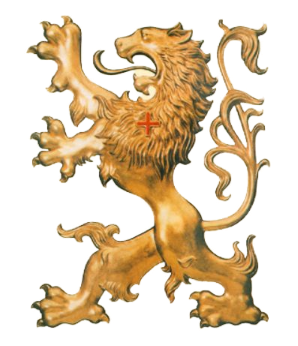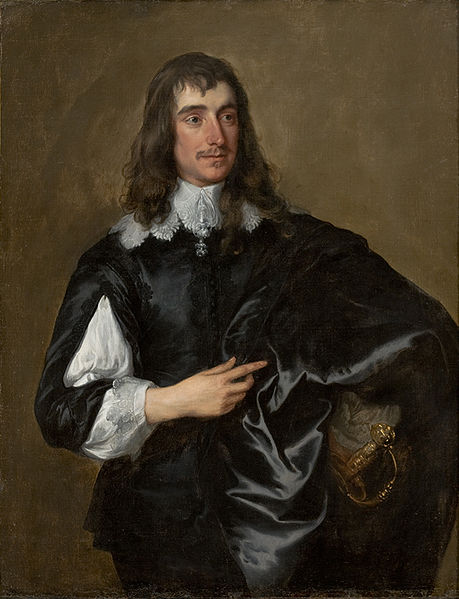|
Plinio Corrêa de Oliveira
Blessed William Howard: From Heroic Fidelity to Counter-attack
Saint of the Day, Friday, April 16, 1971 |
|
|
Blessed William Howard (December 29), 1st Viscount Stafford, martyr; born 30 November 1614; beheaded Tower-Hill, 29 December 1680. Painting by Van Dyck (Bishop Mayer reads about the trial of Blessed William Howard): Blessed William and six other Catholic lords were locked up in the Tower of London under the accusation of conspiring to kill the King. Their trial, however, only took place two years later, when they were physically and morally exhausted. They chose the weakest among them, William, to represent the others at the trial. They assumed that his defense would be ineffective. The trial was iniquitous: William was half-blind, deaf, and exhausted. In these conditions, he was up against ten or twelve of the most outstanding civil lawyers in the country who represented the House of Commons. He was not allowed to talk to his defenders or read witnesses’ testimonies against him. He had to take notes by hand and his defense witnesses were always turned down. However, he fought like a lion because he was judged for his Faith and not for political reasons. One of the prosecutors declared: “I regard today’s cause as the cause of the Protestant religion. We cannot doubt that popery will be extirpated from the English world when you pronounce your sentences. This accusation is the very voice of the country that cries out when it feels the cleaver close to its throat.” The testimonies were evidently false, contradictory, and came from men known to be perjurers. William’s nature did not endow him to keep his serenity and sharpness of mind in the face of that situation. He had no qualms about calling a great lawyer a scoundrel. And when the judge viciously refuted his final defense, he stated, “I am sorry to hear a judge say such a thing. Despite my weak and disturbed state, I assure your lordship that my blood boils when I hear you.” He was sentenced to be hanged, dragged and quartered, but the King commuted his sentence to beheading. See how much mercy! What a kind king!... All circumstances surrounding the death of this English martyr have their natural weight, as you must have noticed. You can imagine the disposition of soul of martyrs imprisoned for two years and mistreated in the prisons of that time, which were not significantly different from today’s political prisons. As many other people had been killed for the same “crime,” and so-called Protestant justice was ruthless toward Catholic defendants, you can imagine spending two years knowing you were going to die. During those two years, death could come from one moment to the next, so their shock multiplied by shock, fear multiplied by fear, and mistreatment weighed heavily on their exhausted health. Imagine the situation of a poor man who, knowing he is physically and psychically weak and worn out, half-blind and half-deaf, is chosen to represent his brothers in a situation of great responsibility while feeling incapable do to so. What must have been his state of mind to face an iniquitous court to which he positively declares that it makes his blood boil with indignation? He appropriately calls one of the lawyers a scoundrel but is obliged to accept his coming demise. He faced this prospect: first, the court decreed that he would be hanged and his body dragged and quartered. You can see the horror of being hanged—a prolonged death in which the body jumps a lot until the person dies of asphyxiation. You can imagine hatred descending on him to such an extent that horses drag his body through the streets until it is completely torn apart. You can easily see all this for yourselves, and it has nothing new for you. It is easy for any Catholic to admire. I find only one datum to add to this, which is perhaps not so well known: their moral situation given the conditions of English public opinion at the time of these trials. England’s transition to Protestantism shows moral degradation infrequent among other peoples Few times in history has a country shown such moral degradation as England did during her transition from Catholicism to Protestantism. There were no fiery Protestant preachers in England who aroused chicanery or sophistry; no satanic demagogues capable of drawing crowds, as was the case of Germany with Luther. England had no ‘square’ but cunning theologians such as Calvin, who, corresponding intensely to the national temperament, dragged people into heresy in France, parts of Switzerland, Scotland, the Netherlands, etc. England had no ideological movement but a bunch of scoundrels. To justify his coming concubinage, the scoundrel king declared himself a Protestant and head of the Church of England and broke with Rome. Everyone saw that his lustful, filthy, and adulterous passion had brought him to that position. Respect for Catherine of Aragon, the King’s legitimate wife, was so profound that she lived surrounded with consideration in a castle on the Irish Sea until she died. There, she raised her daughter Maria Tudor-- heiress to the crown--without anyone daring to say or do anything against her. She was a most respectable person. Therefore, nothing justified the King’s attitude other than his good pleasure at the service of an unclean passion that led him to have adulterous relationships and try to give a deprived woman an air of married respectability. Everyone knew it. They also knew that the King was a brutal man who would strip them of their posts and kill anyone who resisted. He summoned the people to break with Rome without any ideological or doctrinal justification, and almost all the nation’s leaders effectively did. They got their thirty pieces of silver. Few Catholics resisted and were martyred. There was some Catholic resistance among the little people. Some provincial nobles remained Catholic more or less in disguise, and so did some clergy. But very few remained Catholic; the rest massively defected for economic advantage, to save their position, or to spare the life they wanted to preserve at all cost. However, a nationalist note of enthusiasm surrounded that unspeakable if avowedly insincere act of Pharisaism passing from the Catholic Church to the Protestant Church. One of the main points of the English apostasy: self-sufficiency vis-a-vis Rome They presented as progress for England to no longer depend on Rome, that Rome unfortunately so discredited at that time which gave, if not reasons, at least pretexts for that discredit. Looking with supernatural eyes at what was going on in Rome, it was indeed a worldly court with numerous venal men, a court in which they did not sin against the Faith but sinned in every other possible way. Therefore, it was not hard to find a pretext for chicanery. Rome goaded the English national pride. The English wanted to lead their own church and free themselves from the spiritual dominion of a non-English sovereign. English pride--so easy to find in European nations--swelled and, helped by an additional argument, led public opinion to favor the transformation the King was making. They were in the age of royal absolutism, the most popular form of government accepted and applauded by huge crowds. So, the entire population applauded those executions, albeit iniquitous and miserable. The whole population saw (or claimed they saw) those who resisted the King’s orders and renounced an easy and prestigious life as idiots or madmen. They considered martyrs as crazy cretins and booed them as they marched toward the scaffold. As you saw in the life of Thomas More, a film shown here, the families of martyrs would often tempt them to sin and abandon the Faith: “But don’t you love me? Do you want to make me a widow and leave your children orphaned? Do you want to condemn your parents to live a miserable old age without your support? Give in for the love of your parents and family!” English Catholics had a singular trial. They were closed in within the English milieu, atmosphere, and firmament. At that time, the English Channel was a much deeper gulf between Europe and England than it is today; communications were precarious, so they hardly saw anything beyond that. Those martyrs marched toward death under general disapproval and, even worse, public mockery. People questioned their common sense and asked whether they were crazy. So they had to make this act of fidelity to the Catholic Church: “Even if everyone leaves the Church and thinks that what I am doing is crazy; even if the priests before whom I used to kneel for confession, the bishops I revered just recently as bishops of the Catholic Church, the King, whom I hitherto recognized as the Lord’s anointed; even though everyone around me puts moral pressure by saying that I am crazy, I walk toward the scaffold and martyrdom because I trust the Revelation I was given. I trust in the light of the Holy Ghost who tells me that I am not crazy, that this is the true Faith, and that I must stick to it to the end.” It takes strength of soul to face great public pressure loaded with tremendous diabolical charges Indifferent to public opinion and the pressures of their worldly circles, those Catholics held on to the conviction that led them to martyrdom. Note that great pressures from public opinion are usually loaded with tremendous diabolical action. Here is a thesis that seems very true though I think it has not been adopted by all theologians. A preternatural temptation from the devil always accompanies a natural temptation. It is architectonic for great natural temptations to be accompanied by temptations of the devil. Mocking laughter translating public hatred impacts and shakes a person to his very foundations and seems to make him oscillate at the basis of his Faith. That is something people here felt years ago when they had to face the hatred of communist attacks. That massive load of hate makes an individual feel like an object of the hatred of all men and centuries. It takes strength of soul to accept that and walk to death in spite of it. An entirely different condemnation would be: “You will die; everyone out there is saddened.” A person appears at a window, crying and saying, “My son, persevere; you have all my blessings.” A priest we’ve trusted our whole lives appears in a corner dressed as a civilian to avoid persecution and gives us absolution. And we walk to death as the people’s approval serves as a support for our convictions. Not with Blessed Howard. All the natural support for his convictions and self-assurance collapsed and disappeared. He is illuminated only by a ray coming from Heaven and the interior grace assisting him, and walks alone to his death, abandoned by everyone. It is a way of imitating the Passion of Our Lord Jesus Christ, Who had to walk through the streets of Jerusalem, misunderstood, booed, hated, detested, defiled by everyone except Veronica, and consoled by Our Lady and the holy women who accompanied Him along the way. When we study or meditate on the Passion, we see that one of Our Lord’s sufferings, more than His physical sufferings, was precisely this hostility of the people against Him. The English martyr had to endure this hostility. He had to die feeling alone and isolated. And his state of soul showed such firmness in the Faith that we must admire with an exceptional reverence. For example, the people beheaded during the French Revolution knew that millions of French people thought like them. They knew that a part of France had taken up arms to fight on their side. They came out of prisons where there were hundreds of like-minded people. They were not in the isolation this martyr was. There is a facet here that I emphasize very much for the reason I will tell you in a moment. Why do I want to make this clear? The martyrdom imposed on ultramontanes today is similar to that suffered by the martyrs of the English Protestant Revolution. Today, the daily martyrdom asked of an ultramontane is to be a reprobate, ‘canceled,’ isolated and misunderstood, a person with whom others disagree. They give him the cold shoulder or walk away when he appears. A few nights ago, one of you reported on the attitude of Law School freshmen you approached [to do apostolate]. Slandered beforehand, they listened and let you talk freely but did not answer and ran away as soon as possible – precisely to avoid the ultramontane, today’s big dissident. The great dissident is not a terrorist or communist but an ultramontane. He is cast to the sidelines and lives in an invisible ghetto. Our daily martyrdom is to endure the contempt, misunderstanding, and temptation from those who should help us go to Heaven, some of whom are family members. We must ask those who suffered bloody martyrdom in isolation for graces to face the current martyrdom with the strength of soul. We must admire those who went through this martyrdom in incomparably more tragic conditions than ours. Let us ask them to obtain for us by the merit of their firmness, a super-excellent, unshakable firmness of soul that does not bend or back down in front of anything but imposes itself in all circumstances and goes on the counterattack. The beautiful thing about this martyr’s life is not only that he allowed himself to be martyred but went on the counterattack. He called a scoundrel one of the most outstanding London lawyers, scandalizing even the miserable biographer whose text you have just heard. Upon hearing the sentence, he was not intimidated but continued on the counterattack: “I must assure your lordship that my blood boils despite all my weakness.” Boils before what? “Given the iniquity of this sentence.” This disposition of soul to counterattack in isolation or a minority situation is one of the graces Our Lady gives the TFP, which baffles even those who comment about the latter. You have seen how an article in Veja magazine expressed amazement at the young TFP volunteers’ indifference when facing criticism, jokes, and sarcasm leveled at them. But that is a grace—it does not come from our nature. Man’s nature is weak and, at best, vacillates between imprudent arrogance and cowardly weakness. Cowardice and weakness are the poles between which human disorder oscillates due to original sin. That did not happen with this saint. He defended himself as best he could and counterattacked like a lion because he had nothing left to lose. He had truths to tell and told them to those judges. He is an admirable example for us. We can ask this saint that, by the special merits conquered with his martyrdom, especially that form of martyrdom which means resisting temptations from family and seductions of public opinion, he increasingly obtain for us the firmness that our vocation demands. |
|


